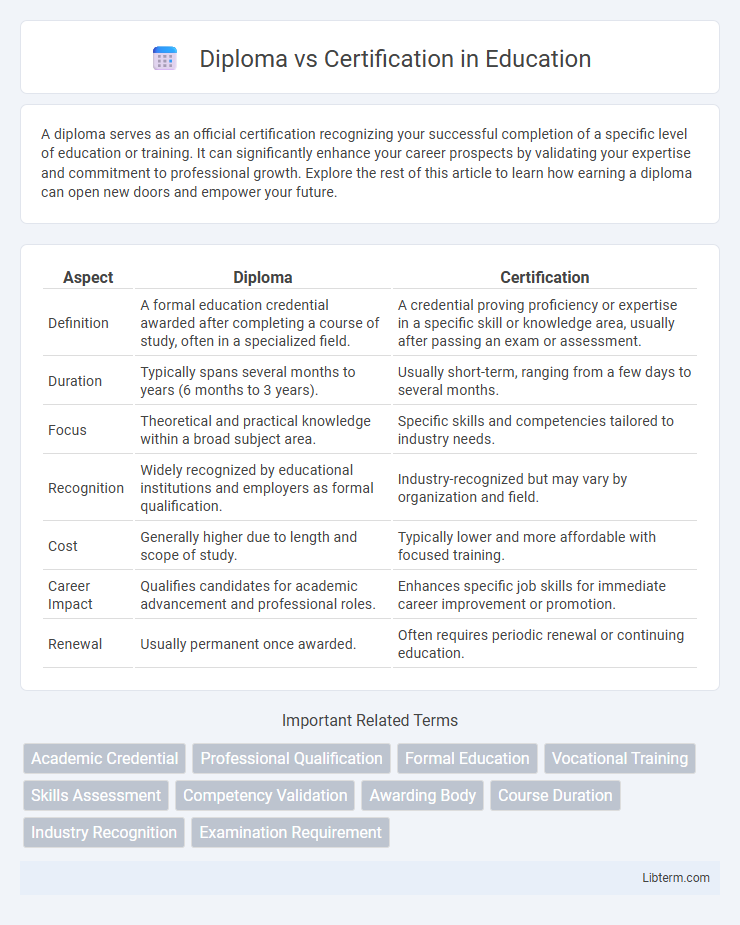A diploma serves as an official certification recognizing your successful completion of a specific level of education or training. It can significantly enhance your career prospects by validating your expertise and commitment to professional growth. Explore the rest of this article to learn how earning a diploma can open new doors and empower your future.
Table of Comparison
| Aspect | Diploma | Certification |
|---|---|---|
| Definition | A formal education credential awarded after completing a course of study, often in a specialized field. | A credential proving proficiency or expertise in a specific skill or knowledge area, usually after passing an exam or assessment. |
| Duration | Typically spans several months to years (6 months to 3 years). | Usually short-term, ranging from a few days to several months. |
| Focus | Theoretical and practical knowledge within a broad subject area. | Specific skills and competencies tailored to industry needs. |
| Recognition | Widely recognized by educational institutions and employers as formal qualification. | Industry-recognized but may vary by organization and field. |
| Cost | Generally higher due to length and scope of study. | Typically lower and more affordable with focused training. |
| Career Impact | Qualifies candidates for academic advancement and professional roles. | Enhances specific job skills for immediate career improvement or promotion. |
| Renewal | Usually permanent once awarded. | Often requires periodic renewal or continuing education. |
Understanding the Basics: What Are Diplomas and Certifications?
Diplomas represent formal academic achievements awarded by educational institutions after completing a structured course, often lasting from several months to years, demonstrating comprehensive knowledge in a particular field. Certifications, however, are credentials granted by professional organizations or certifying bodies to validate specific skills or competencies, typically requiring passing an exam or meeting experience criteria. Both diplomas and certifications serve distinct purposes in career advancement, with diplomas emphasizing theoretical understanding and certifications focusing on practical expertise.
Key Differences Between Diploma and Certification Programs
Diploma programs usually offer comprehensive, in-depth knowledge over several months to years, focusing on practical skills and theoretical understanding within a specific field, while certification programs provide specialized training and validate competency in particular skills or technologies through shorter, targeted courses. Diplomas often require completion of multiple modules and assessments, contributing to formal education credentials recognized by educational institutions, whereas certifications are typically awarded after passing an exam or meeting criteria set by industry bodies, aiming to enhance professional credentials. Employers may view diplomas as evidence of broad expertise, whereas certifications demonstrate up-to-date proficiency and commitment to continuous skill development.
Duration and Structure: Diploma vs Certification
Diplomas typically require one to three years of study with a comprehensive curriculum covering theoretical and practical knowledge, often including assessments and projects. Certifications are shorter, ranging from a few weeks to several months, focused on specific skills or competencies with targeted training and exams. The structure of diplomas favors in-depth learning and broader subject matter, while certifications emphasize rapid skill acquisition and immediate applicability.
Admission Requirements: Who Qualifies?
Diploma programs typically require a high school diploma or equivalent and may include specific prerequisites depending on the field of study, making them accessible to recent graduates or those with foundational education. Certification courses often demand relevant work experience or prior knowledge in the subject area, targeting professionals seeking to validate and enhance specialized skills. Admission for diploma programs tends to focus on academic qualifications, whereas certification programs emphasize industry experience and competency.
Curriculum Focus: Comprehensive vs Specialized Learning
Diplomas offer a comprehensive curriculum that covers a broad range of subjects and foundational knowledge within a field, providing a well-rounded education suitable for various career paths. Certifications focus on specialized learning, targeting specific skills or expertise required for particular job roles or industry standards. This specialization enables professionals to quickly demonstrate proficiency and advance in niche areas without extensive general coursework.
Career Opportunities After a Diploma vs Certification
Career opportunities after earning a diploma often include entry to mid-level positions in industries like healthcare, engineering, or business, providing a broader knowledge foundation. Certifications typically enhance specific skills or expertise, increasing job prospects in specialized fields such as IT, project management, or cybersecurity. Employers value diplomas for comprehensive education, while certifications demonstrate up-to-date skills and commitment to professional development.
Industry Recognition: Which Holds More Value?
Industry recognition for certifications often surpasses that of diplomas due to their specialized focus and alignment with current job market demands. Certifications from reputable organizations like CompTIA, Cisco, or PMI provide employers with verified proof of specific skills and expertise, enhancing employability and career advancement. Diplomas, while valuable for foundational knowledge, may be perceived as less targeted compared to certifications tailored to industry standards.
Cost Comparison: Diploma vs Certification
Diploma programs typically involve higher tuition fees and longer study durations compared to certification courses, making them a more significant financial investment. Certification programs are usually shorter and more affordable, focusing on specific skills or industries, which makes them cost-effective for quick skill enhancement. When choosing between diploma and certification, consider both the upfront costs and the potential return on investment based on career goals and industry demand.
Flexibility and Learning Modalities
Diplomas typically offer structured learning pathways with fixed schedules and comprehensive curricula, which may limit flexibility for working professionals. Certifications often provide modular courses and self-paced learning options, enabling learners to tailor study times and focus areas according to individual needs. Online platforms and blended learning modalities enhance accessibility, making certifications more adaptable for diverse learning preferences and busy lifestyles.
Choosing the Right Path: Which Is Best for Your Career Goals?
Choosing between a diploma and certification depends on your career goals, industry requirements, and time commitment preferences. Diplomas often provide comprehensive education with broader theoretical knowledge, ideal for careers requiring deep understanding and foundational skills. Certifications offer targeted expertise and are highly valued in fast-evolving fields like IT and healthcare, supporting rapid skill acquisition and specialized career advancement.
Diploma Infographic

 libterm.com
libterm.com